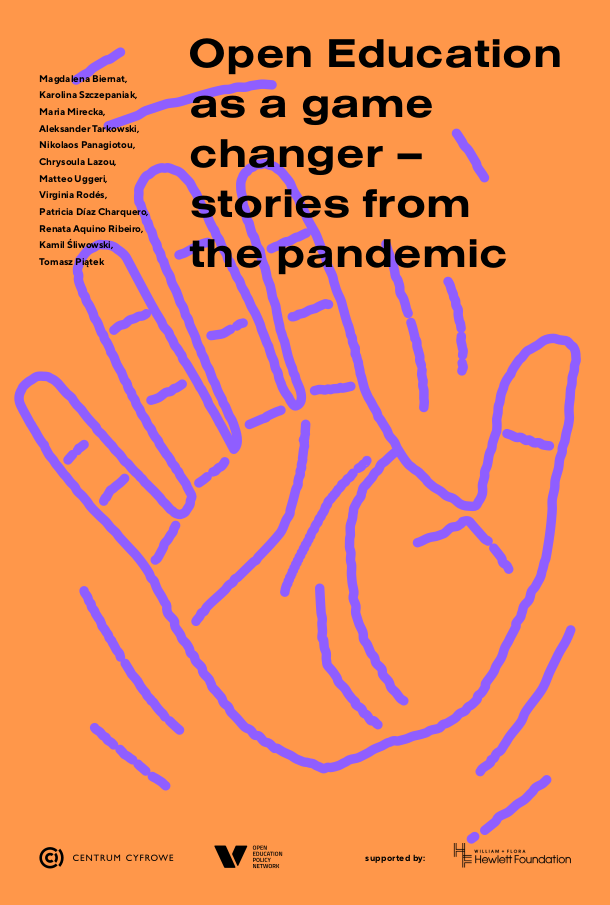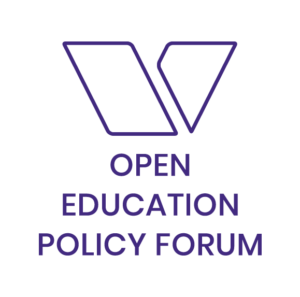
The report by Centrum Cyfrowe
Pobierz raport PL
Download report EN
Download editable slides EN
- The study presents examples of positive initiatives and changes in education that originated as a reaction to the closure of schools during the COVID-19 pandemic in 2020 and which are part of what is known as Open Educational Practices and Open Educational Resources.
- The aim of the analysis is to gather information about the most interesting and influential Open Education initiatives which could inspire and hopefully permanently revolutionize remote education systems around the world. An important objective is to initiate a discussion on the role played by Open Education during the pandemic and to provide arguments to support public policymaking.
- The target group of the document is people involved in promoting policymaking in support of Open Education worldwide, representatives of international and national institutions operating in the field of education as well as representatives of Ministries of Education and educators.
„I have always believed in Open Education. I think that the most important lesson is the realization of the need for the OE to become an integral part of our education system not only because access to OER helps to create engaging online classes. OE also provides a concrete vision of solving problems and facing challenges” — Lia, teacher, primary education, Greece, July 2020
„I think teachers did learn something. They did not believe in the virtual world, they only believed in face-to-face, and it seems to me that what has happened is going to change teaching. I think that if the authorities embrace this opportunity, it will offer an infinite world of possibilities” — a teacher, primary education, Uruguay, July 2020
Watch the presentation
Key conclusions
The following conclusions were drawn on the basis of the records of discussions between the authors of the report and the activists of Open Education during a two-day workshop in October 2020.
a) Resources, institutions and infrastructure built on the Open Education model provide resilience to educational systems. Countries with existing OER repositories or communities of practice based on the vision of Open Education were better prepared for the emergency switch to remote education.
b) Teachers were the first responders during the educational crisis. Networks of teachers were quickly formed, using communication technologies available to them. These networks created and shared teaching resources, and provided teachers with mutual support.
c) Grassroots initiatives require support to function for a longer time. Public institutions need to partner with informal initiatives, in order to make them sustainable and help them scale up.
d) Actors of many types took action and supported remote education: non-governmental organisations, universities, city governments. Ministries of Education need to adopt a multi-stakeholder model to manage remote education which acknowledges this support.
e) Open Education does not solely rely on sharing openly licensed educational resources. It also harnesses practices of collaboration, content creation, networking and mutual support based on values of openness, solidarity and equality.
f) At the time of crisis, educators and learners used any technologies and resources available. Over time, remote education requires the provision of necessary public infrastructure, educational services and resources. Openness of resources ensures legal clarity for educators and learners.
g) The digital divide – lack of access to equipment and the internet as well as insufficient conditions for teaching and learning – became even more prominent during the pandemic. More than ever, the Open Education approach must ensure justice and equality of education by securing the basic access for everyone and by developing educational models that aim to limit these inequalities and make remote education accessible to all.
Authors
Magdalena Biernat, Poland, Centrum Cyfrowe – originator of the study, author and editor,
Karolina Szczepaniak, Poland, Centrum Cyfrowe,
Maria Mirecka, Poland, Centrum Cyfrowe,
Alek Tarkowski, PhD, Poland, Centrum Cyfrowe,
Nikolaos Panagiotou, PhD, Greece,
Chrysoula Lazou, Greece,
Matteo Uggeri, Italy,
Virginia Rodés, Uruguay,
Patricia DĂaz Charquero, Uruguay,
Renata Aquino Ribeiro, Brazil,
Kamil Ĺšliwowski, Poland,
Tomasz PiÄ…tek, Poland
Methodology
a) In the first stage of the study, we prepared a questionnaire which was sent out to people connected with Open Education all over the world. Through the survey, we gathered general information about the situation during the pandemic in individual countries as well as top-down and bottom-up initiatives taken to support remote learning for pupils, teachers, educators and parents.
b) Based on the conclusions of the study, we decided to choose initiatives from five countries – Brazil, Greece, Poland, Uruguay and Italy. In each of the selected countries, we contacted one or two researchers from the area of Open Education who, using the desk research method and interviewing 2-3 teachers, described the picture of Open Education during the pandemic and selected initiatives.
c) After preparing the first drafts of the publication, we organized a two-day workshop where, together with researchers and several open education activists from all over the world, we worked on the final shape of the publication, the conclusions from the collected stories, the importance of these examples from the perspective of UNESCO Recommendation on Open Educational Resources and their use for advocacy activities in the field of Open Education. The conclusions from the workshop have been incorporated into the content and form of this publication.
License
We invite you to make extensive use of the materials available on the website. Unless otherwise stated, all material is available under the Creative Commons Attribution 4.0 license.
Support

Supported by the William and Flora Hewlett Foundation

Contact
Fundacja Centrum Cyfrowe
ul. Chmielna 24/2
00-020 Warszawa
kontakt@centrumcyfrowe.pl
mbiernat@centrumcyfrowe.pl